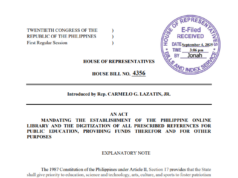CLARK FREEPORT – The Office of Government Corporate Counsel (OGCC) has opined that members of the board of directors of subsidiaries of the Bases Conversion Development Authority (BCDA) can stay on under the Aquino administration.
But this will depend on whether their appointment papers explicitly state that their posts were co-terminus with the term of former Pres. Arroyo, or unless Pres. Aquino either orders their removal from office or appoints somebody else to their posts.
Issuing Opinion No. 109, series of 2010, OGCC officer-in-charge Elpidio Vega expressed this view addressed to BCDA president and chief executive officer Narciso Abaya after the President issued Memorandum Circular No. 1 last June 30.
Abaya sought the OGCC’s opinion to settle disputes on whether the terms of the members of the board of BCDA subsidiaries Clark Development Corp. (CDC), Clark International Airport Corp. (CIAC), John Hay Management Corp. (JHMC) and Bataan Technology Park Corp. (BTPC) expired as of last June 30 under the circular.
Vega noted that the circular applied only to “all presidential appointees whose appointments indicate their status as co- terminus” and that “co-terminus presidential appointees are those whose appointments co-exist with the term of the President who made the appointments.
“BCDA is thus advised to examine the appointment documents of the said board members to determine if the nature and status of their appointment are expressly provided therein. If the board members’ appointment documents are silent on the matter, they cannot be considered separated from office as of June 30, 2010 since the guidelines explicitly require that there must be a clear indication of the co-terminus status of the appointment,” Vega said.
Vega also cited provisions of Republic Act 7227 that created the BCDA which authorizes it to form a subsidiary corporation in accordance with the Philippine Corporation Law.”
He noted that a provision of this law states that “the power and functions of the subsidiaries or attached authorities of the BCDA shall be exercised by their respective board of directors to be appointed by the President of the Philippines upon recommendation of the chairman of the BCDA.”
The law provides that “the board shall be composed of a minimum of seven members who being trustees of the government, may be removed at any time by the President”, he further noted.
Vega also cited Executive Order No. 62 which states that “a member of the board of directors of the BCDA’s subsidiaries shall continue to serve in office until removed by the President.”
“Such removal from office may either be through an express directive which specifically relieves him of the post or through the appointment of his successor,” EO 62 also provides.
The OGCC opinion also said that “we opine that Memorandum Circular No. 1 cannot be construed as to render all positions in the respective boards of the BCDA’s subsidiaries to be vacant since the same would unduly disrupt and detrimentally affect the latter’s business operations.”
“Public welfare and interest are best served by enduring that the members of the governing board of the BCDA’s subsidiaries continue to serve until such time that the president should appoint their successors, unless otherwise indicated in their appointment documents.”
The other day, Malacañang declared that all midnight appointees of former president Arroyo must immediately vacate their offices pending the resolution of petitions filed against the implementation of Executive Order 2 revoking the appointments made during the prohibited period.
Presidential spokesman Edwin Lacierda and Solicitor General Jose Anselmo Cadiz said since the Supreme Court did not issue the temporary restraining order (TRO) that was sought by the government officials who questioned EO 2, then the midnight appointees should automatically vacate their offices.
Lacierda said the midnight appointees are not part of the Aquino administration’s plans and vision for the country and might only hinder the new government’s actions.
But this will depend on whether their appointment papers explicitly state that their posts were co-terminus with the term of former Pres. Arroyo, or unless Pres. Aquino either orders their removal from office or appoints somebody else to their posts.
Issuing Opinion No. 109, series of 2010, OGCC officer-in-charge Elpidio Vega expressed this view addressed to BCDA president and chief executive officer Narciso Abaya after the President issued Memorandum Circular No. 1 last June 30.
Abaya sought the OGCC’s opinion to settle disputes on whether the terms of the members of the board of BCDA subsidiaries Clark Development Corp. (CDC), Clark International Airport Corp. (CIAC), John Hay Management Corp. (JHMC) and Bataan Technology Park Corp. (BTPC) expired as of last June 30 under the circular.
Vega noted that the circular applied only to “all presidential appointees whose appointments indicate their status as co- terminus” and that “co-terminus presidential appointees are those whose appointments co-exist with the term of the President who made the appointments.
“BCDA is thus advised to examine the appointment documents of the said board members to determine if the nature and status of their appointment are expressly provided therein. If the board members’ appointment documents are silent on the matter, they cannot be considered separated from office as of June 30, 2010 since the guidelines explicitly require that there must be a clear indication of the co-terminus status of the appointment,” Vega said.
Vega also cited provisions of Republic Act 7227 that created the BCDA which authorizes it to form a subsidiary corporation in accordance with the Philippine Corporation Law.”
He noted that a provision of this law states that “the power and functions of the subsidiaries or attached authorities of the BCDA shall be exercised by their respective board of directors to be appointed by the President of the Philippines upon recommendation of the chairman of the BCDA.”
The law provides that “the board shall be composed of a minimum of seven members who being trustees of the government, may be removed at any time by the President”, he further noted.
Vega also cited Executive Order No. 62 which states that “a member of the board of directors of the BCDA’s subsidiaries shall continue to serve in office until removed by the President.”
“Such removal from office may either be through an express directive which specifically relieves him of the post or through the appointment of his successor,” EO 62 also provides.
The OGCC opinion also said that “we opine that Memorandum Circular No. 1 cannot be construed as to render all positions in the respective boards of the BCDA’s subsidiaries to be vacant since the same would unduly disrupt and detrimentally affect the latter’s business operations.”
“Public welfare and interest are best served by enduring that the members of the governing board of the BCDA’s subsidiaries continue to serve until such time that the president should appoint their successors, unless otherwise indicated in their appointment documents.”
The other day, Malacañang declared that all midnight appointees of former president Arroyo must immediately vacate their offices pending the resolution of petitions filed against the implementation of Executive Order 2 revoking the appointments made during the prohibited period.
Presidential spokesman Edwin Lacierda and Solicitor General Jose Anselmo Cadiz said since the Supreme Court did not issue the temporary restraining order (TRO) that was sought by the government officials who questioned EO 2, then the midnight appointees should automatically vacate their offices.
Lacierda said the midnight appointees are not part of the Aquino administration’s plans and vision for the country and might only hinder the new government’s actions.



